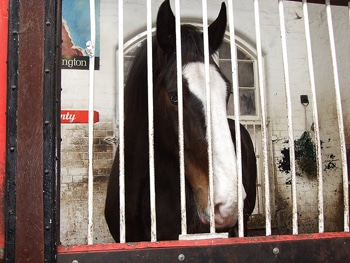Is music played in your barn? Ever wonder if the horses like it? A study by researchers at Hartpury College in England found horses liked classical and country sounds more than they did rock and jazz.
To test the effects of different kinds of music on stabled horses, Clare Carter, a Bachelor of Science student, and her supervisor Linda Greening, studied eight Thoroughbred geldings that had been stabled for three hours.
They played four different kinds of music – classical (Beethoven), country (Hank Williams Jr.), rock (Green Day), and jazz (New Stories)–for 30 minutes each.
1. All together, how much time was music played? Express your answer in both minutes and hours.
They also observed the horses’ behaviour for 30 minutes without music.
The researchers recorded detailed behaviour observations for each 30 minute segment; 120 behaviours per horse for each genre of music. They used an equine ethogram to determine what behaviours to look for. An ethogram is a catalogue of all behaviors or actions exhibited by horses.
2. For each horse, how many behaviour observations were recorded all together? Be sure to include the 30 minutes when music was not played.

Monty the Shire horse, part of the Coors Shire horse team.
The pair determined that horses showed the same balance of restful and alert behaviours during classical and country music as they did when there was no music at all. But the difference between these kinds of music and silence was that with country, on average, the horses tended to eat more quietly (a natural behaviour that reflects calmness and good welfare, said Carter) than they did with silence.
On the other hand, jazz and rock music caused horses to display more frequent stressful behaviors (as compared to silence), indicated by stamping, head tossing, snorting, and vocalizing (whinnying), said Greening. They did not observe any of these behaviours in the horses when classical or country music was played or when there was no music. Carter also noted that while the horses still ate when listening to jazz or rock, they did so nervously, “snatching at food in short bursts,” she said.
Jazz seemed to bother the horses the most, according to Carter. “This might be due to the fast tempo and minor key,” she said. The researchers also recommended playing music at a volume – only 21 decibels – when in the barn.
Science Talk: the decibel (abbreviated dB) is the unit used to measure the intensity of a sound. 70+ dB is about the level of the sound of a TV in your living room at normal level. 60 dB is about the level of normal conversation.
3. How many more dB is the level of normal conversation as compared to the level of sound the researchers recommend for music in the barn?
In conclusion, said Carter, “The behaviours that horses showed while listening to classical and country music suggested that the music had an enriching effect on the environment of the stabled horse,” said Carter.
Further studies are planned for the future, the researchers said.
1. All together, how much time was music played?
Answer: 4 x 30 minutes = 120 minutes or 2 hours.
2. For each horse, how many behaviour observations were recorded all together? Be sure to include the 30 minutes when music was not played.
Answer: 120 x 5 = 600. 600 behaviour observations were recorded all together.
3. How many more dB is the level of normal conversation as compared to the level of sound the researchers recommend for music in the barn?
Answer: 60 – 21 = 39. Normal conversation is 39 dB higher than the level of sound the researchers recommend for music in the barn.
Photos:
Buckskin mare looking out of her stall window by Derrick Coetzee; CC BY 2.0
Monty the shire horse by Tamsin Slater; CC BY-SA 2.0








https://www.youtube.com/watch?v=wQg-TZPB0Gg
These 5 horses had never heard any kind of music before , living out in a field. The old one ,called Ara, only had a couple of weeks left to live. They seemed to like the piece of folk music played on the violin…. ( the nodding was due to loads of flies that you can’t see)
Would be nice to think they did like it!